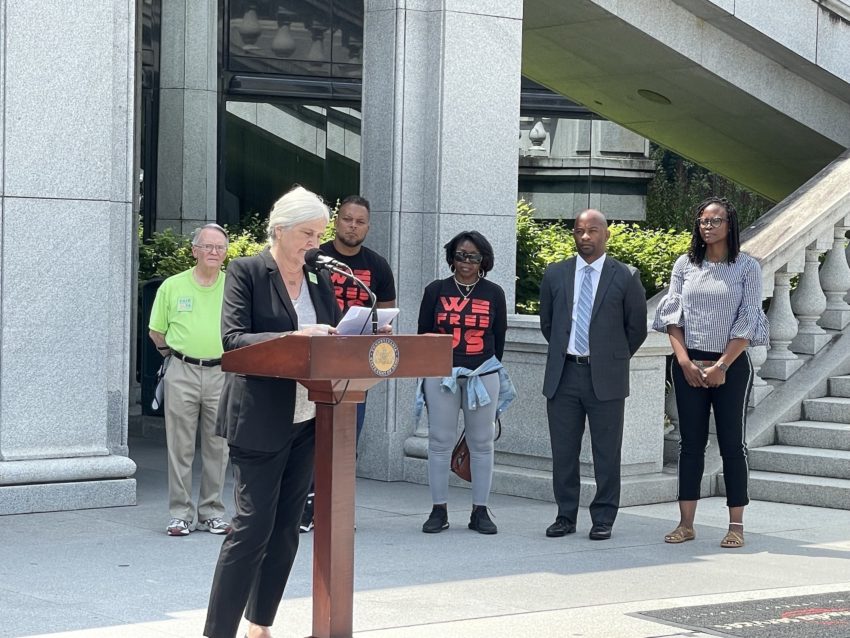Why We Work on Prison Gerrymandering
Fair Districts PA Chair Carol Kuniholm spoke at a recent press conference on prison gerrymandering, explaining the need to count incarcerated persons in their own communities and urging the Legislative Reapportionment Commission to take action. Her comments are below.
Some mornings I sit on my quiet backyard patio and think of men and women who have not spent the morning sitting in the sun in decades because of something that happened one day when they were kids. I think of our friend Saleem Holbrook, who was accessory to a capital crime on the day he turned 16. He didn’t hold the gun. He didn’t pull the trigger. But he was somewhere nearby when someone he knew made a terrible choice and for that he spent more than two decades in PA prisons.
I think of other once-young offenders still serving time decades after they’ve paid any reasonable debt to society, decades after any statistical probability of recidivism. PA has one of the largest geriatric prison populations on the planet, driving up costs while needlessly confining aging men and women. Bills to address this are introduced in every session, but sit in committee because committee chairs are. not. interested.
I think of my friend Curtis pulled from his home while his five children watched, stuck in jail for months because he couldn’t afford an unreasonably high bail. When he finally met his public defender, just minutes before his hearing, he was encouraged to plead guilty, since he had time already served. He did as he was told and a decade later he’s still on parole for a crime he didn’t commit. Pennsylvania is still the only state with no statewide administration or funding of right to counsel services. Efforts to address that vanish in committee, or are lost in the back rooms where budget deals are made. Because not enough legislators care. And those that do have little say in what takes place in the building behind us.
I came to this issue in the 80s and 90s when my husband Whitney worked for Prison Fellowship, an organization founded by Chuck Colson, one of the few members of the Nixon administration who served time in the aftermath of Watergate. With Whitney, I worked alongside Republican and Democratic governors, legislators, pastors and lawyers advocating together for common sense prison reforms. Few, if any, of those reforms were ever enacted here in Pennsylvania. Because relevant committee chairs, and powerful legislative leaders, do. not. care.
Redistricting is never just about district lines or elections or even who ends up in office. It is also, always, about policy, priorities and people. District lines that count incarcerated people in the places where they are incarcerated have helped fuel further incarceration. We are here to speak for people who cannot be here to speak for themselves, people we love who are still behind bars, people we know whose lives have been destroyed by unjust laws and inequitable policy.
People ask me why I continue in the work for fair redistricting after years of setbacks and disappointments. It’s because of men and women I care about whose futures have been strangled by unjust policy and all the children in this commonwealth who will never thrive until the legislators who care outnumber those who don’t.
Last winter Fair Districts PA and partner organizations held a series of regional forums on the issue of prison-based gerrymandering. We heard from formerly incarcerated persons regarding their lack of representation. When they reached out to legislators in the districts where they were counted they were told “You’re not my constituent.” We heard from family members aware that their communities had lost representation by the current census bureau practice of counting people in prison, rather than their home communities. And we heard from legislators in those impacted communities, burdened by their efforts to provide representation and solve pressing concerns of incarcerated persons far from home.
We also looked at data, which showed the impact on our minority communities. Pennsylvanians of color, the vast majority of whom have no criminal background, are particularly likely to live in districts that lose significant representation, while the districts that benefit are typically majority-white. But rural communities are impacted as well: voters within prison counties find the reach of their vote magnified, while voters in counties just next door can find their vote diluted.
There is ample legal precedent to demonstrate that the Legislative Reapportionment Commission - alone - bears responsibility for determining what data to use in redistricting. While the Census Bureau failed to act on thousands of public comments requesting a change to the way incarcerated persons are counted, the Bureau will provide the data and adjustment tools to any state, county or local government interested in reallocating the data of incarcerated persons to their home communities.
Before the census began in 2020, Fair Districts PA and other advocacy groups asked the administration to ensure that the Department of Corrections provide an alternate data set, retaining information about last known address for individuals in state prisons. That data set is ready for use in adjusting the census bureau count.
We have heard from some legislators and representatives of local government that reallocation would create financial hardship for locations hosting PA prisons. Such concerns demonstrate a misunderstanding of the way funding is allocated and suggests that LRC adjustments would be applied in all other contexts. From all research we’ve seen, reallocation would have no impact at all on local funding. It is not possible to create districts that truly represent PA counties, constituents and communities without addressing this issue.
